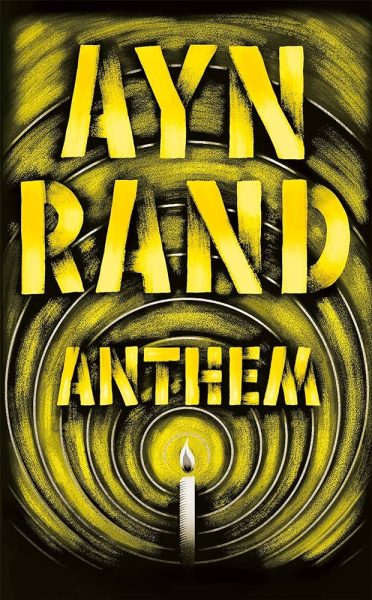
How do we know when to push back against our senses and fight for what’s right? In today’s world, it has become increasingly difficult to make the right choices in a society with frequent travesties. With justice as a common theme in our day-to-day lives, how will we know when it’s time to turn against our instincts and fight for what we believe in even if others disagree? In 1938, Ayn Rand wrote the powerful novel Anthem. Rand was a Russian born American author and philosopher who became famous for her controversial messages in her novels. Rand’s novel still stands as a testament to the eternal struggle between conformity and individuality. Anthem confronts the distortion of a seemingly utopian society that has profound fractures beneath its polished facade. This quick page-turner is equal parts thought-provoking, entertaining, and intriguing.
Anthem introduces us to a young man named Equality 7-2521, who yearns for intellectual pursuits, and to be a scholar in a world where the government controls every aspect of human existence. Equality 7-2521’s society is meticulously controlled to the point that individual identity isn’t allowed. Everyone has to use the pronoun “we” and solitude is forbidden. Along with this, all children are sent to live in the Home of Students where they are educated until they are assigned a job. All throughout his education, Equality 7-2521 was punished for being too smart and too tall. Equality 7-2521 was assigned the job of a street sweeper instead of a scholar, which crushed his dreams. Although it was heartbreaking, this job let him enjoy the company of his own thoughts, despite the fact that he wasn’t able to be innovative and make discoveries in the world.
Rand gracefully depicts Equality 7-2521’s form of resistance and rebellion against the government. For example, one night Equality 7-2521 stumbles upon a tunnel from the “unmentionable times,” a period of time where individualism led to the downfall of humanity. Equality 7-2521 begins to frequent the tunnel, often to tackle world problems and find solace in the quiet he couldn’t experience elsewhere. Equality 7-2521 begins to journal and run experiments to unearth new technology such as electricity, which leads him to build a light bulb.
Equality 7-2521 journals about the traumatic experiences he faces from not fitting in with the rest of society. All his life he tried to conform to societal expectations, but was always different. Equality 7-2521 even journals about the public execution of a man who discovered the word “I.” As the man burned, he made direct eye contact with Equality 7-2521, which impacted his life forever.
Amidst the animosity faced by Equality 7-2521, he also encounters forbidden love. Everything changes when Equality 7-2521 meets The Chosen One. Even though it isn’t allowed, Equality 7-2521 begins to speak with her and they fall in love instantly. One night, Equality 7-2521 arrives late at the home of the street sweepers as he is in the tunnel working on his experiments. He immediately is thrown into the Palace of the Correctional Detention where he is tortured.
The novella reaches its peak when Equality 7-2521 attempts to tell the World Council about his discovery of electricity. Instead of acceptance, he immediately faces rejection and threats. The council threatens to kill him and get rid of his lightbulb, which causes him to flee to the uncharted forest. Rand carefully contrasts the city as a suffocating environment with the wilderness as liberating, again symbolizing the struggle between societal norms and individuality.
Rand delves deeper into the themes of collectivism and individualism. Particularly imitating an environment similar to totalitarian regimes such as Nazi Germany, Fascist Italy, and Communist Russia. During the time period, her novel wasn’t accepted because of the constant spread of collectivism across the globe.
Rand describes collectivism as the principle of giving a group more priority rather than the individual, as an evil rather than a strength. Her bravery shone brightly by describing collectivism as an evil force during a tumultuous era in history. Rand challenged the ideas of many dictators while also spreading hope to many individuals.
In essence, Anthem’s ideas are still very relevant and also offer a timeless reflection on the human sacrifice it takes to achieve autonomy. With the current war in Israel, dictatorship in North Korea, and the war between Russia and Ukraine, these ideas are more applicable than ever. Rand’s narrative possesses relevance to its themes today, especially with dictatorship and inequality that courses throughout our current society. Anthem is a must-read that demonstrates its power and key influence on society almost a century after publication and is bound to leave a large impact on your life


